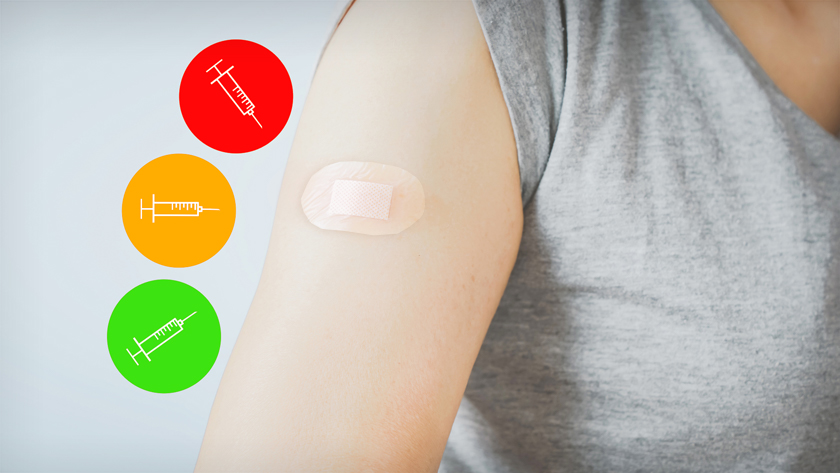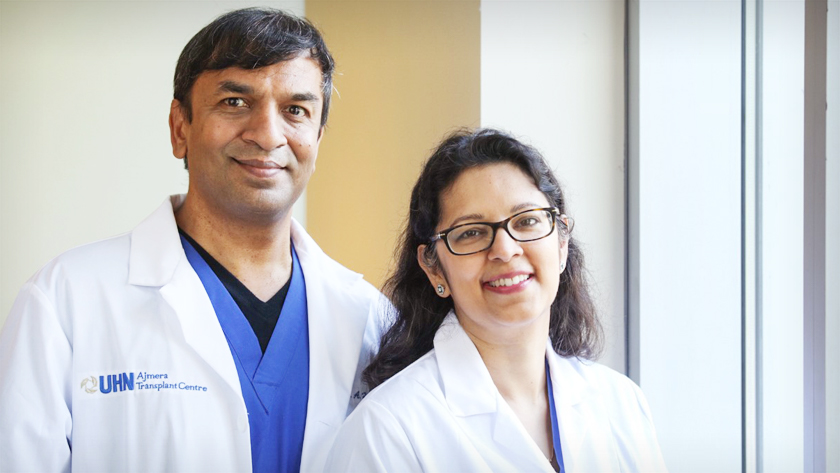
In the first randomized, placebo-controlled trial of a COVID-19 booster vaccine in transplant recipients, scientists at UHN’s Ajmera Transplant Centre have demonstrated that a third dose of the Moderna vaccine is safe and induces a robust immune response.
“We knew from previous studies that two doses of existing vaccines are not enough to produce a strong immune response against COVID-19 in transplant patients,” says Dr. Deepali Kumar, Director of Transplant Infectious Diseases at UHN and joint-senior author of the study published in the New England Journal of Medicine.
“Based on our study, a third dose of the Moderna vaccine appears to increase protection in transplant recipients.”
The clinical trial was randomized, double-blind and placebo-controlled—providing a level of rigour that is considered the gold standard in medicine. The trial enrolled 120 transplant patients that had not previously contracted COVID-19 and had received two doses of the Moderna vaccine. At the two-month mark after their second dose, half of the participants received a third shot of the Moderna vaccine and the other half received a placebo.
The researchers measured whether the booster shot increased antibody levels against the spike protein of the SARS-CoV-2 virus to greater than 100 U/ml—a level that is believed to provide at least 50% protection against developing COVID-19 based on previous studies. After three doses, only 18% of the participants in the placebo group showed this response, whereas 55% of those in the vaccine group met or exceeded these antibody levels.
The research team also looked at whether the booster shot led to the production of neutralizing antibodies—antibodies that can bind to and neutralize the virus. In the Moderna group, 60% tested positive for at least some ability to neutralize the virus, compared to only 25% of participants in the placebo group. The researchers also found higher levels of T-cells that can specifically target the virus in the Moderna group compared to the placebo group. T-cells are a component of the immune system that can help prevent severe disease by either killing infected cells or promoting responses by other parts of the immune system.
In terms of safety, the booster vaccine was well tolerated, associated with only mild side effects and did not lead to organ rejection. “We found that the third dose was safe and increased immune responses in transplant patients. These findings are quite definitive and tell us that third doses should be given to this vulnerable population to help prevent COVID-19,” says Dr. Atul Humar, Medical Director of the Ajmera Transplant Centre, UHN and the joint-senior author of the study.
Source: UHN.ca
This work was supported by the UHN Ajmera Transplant Centre, the Di Poce Transplant Fund, and the UHN Foundation. The Government of Canada, through its COVID-19 Immunity Task Force and Vaccine Surveillance Reference Group, is investing over $2.8 million so that Dr. Kumar’s team can further study the effectiveness of COVID-19 vaccines across multiple transplant centres in Canada.
The results have been shared with regulatory bodies and decision-makers including the United States Food and Drug Administration, the National Advisory Committee on Immunization, the American Society of Transplantation and others.
Hall VG, Ferreira VH, Ku T, Ierullo M, Majchrzak-Kita B, Chaparro C, Selzner N, Schiff J, McDonald M, Thomlinson G, Kulasingam V, Kumar D, Humar A. A Randomized Trial of Third Dose mRNA-1273 Vaccine in Transplant Recipients. NEJM. 2021 August 11. doi: 10.1056/NEJMc2111462.

Drs. Atul Humar (left) and Deepali Kumar (right) are co-senior authors of the study. Dr. Kumar is a Clinician Investigator at TGHRI; Dr. Humar is a Senior Scientist at TGHRI (image credit: Tim Fraser Photography).

Drs. Victoria Hall (left) and Victor Ferreira (right) are co-first authors of the study. Dr. Hall is a clinical fellow at Toronto General Hospital; Dr. Ferreira is a scientific associate at the Toronto General Hospital Research Institute (TGHRI).




